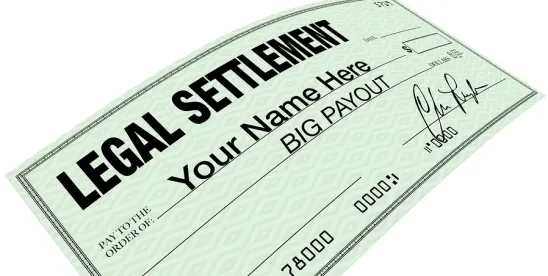The recently enacted "Tax Cuts and Jobs Act of 2017" (P.L 115-97) (the "Act") made, among others, significant changes to the rules that govern whether taxpayers can deduct as business expenses certain settlement payments made to the government in connection with investigations of violations of law. Taxpayers who are negotiating settlement agreements with the government under any statute that provide for monetary damages or settlements need to be aware of these changes, as they will impact the ability to take business tax deductions for any amounts paid to, or at the direction of, the government.
Generally, a taxpayer may be able to deduct as a business expense certain payments made to a private party to settle a claim. Prior to the Act, Section 162(f)1 expressly barred the deduction of "any fine or similar penalty paid to a government for the violation of any law." Treasury regulations defined a "fine or similar penalty" under Section 162(f) as including amounts paid to settle an actual or potential liability for a fine or penalty, and as including both civil and criminal penalties. These same regulations, however, clarified that payments that were compensatory in nature were not penalties under Section 162(f). To determine what constituted a "compensatory" payment, the courts focused on whether the payment was primarily a remedial measure to compensate another party or if it was intended to be a punitive measure. Furthermore, Congress did not intend Section 162(f) to apply to "sanctions imposed to encourage prompt compliance with requirements of law," and acknowledged that many "penalties" that are imposed by jurisdictions are really to encourage prompt compliance and thus should not fall under Section 162(f), despite being called a "penalty." Therefore, the key factor in determining the purpose of the payment was the intent of the parties. As a result, prior to the Act, the IRS did not bar taxpayers from deducting settlement amounts so long as the taxpayer could prove that the amounts paid to the government were intended by all the parties to be compensatory or to encourage prompt compliance with the law, and not punitive in nature.2
Through the Act, Congress replaced and amended Section 162(f) with the following changes in an apparent effort to incorporate greater clarity into the law:
-
Expanded Scope. The Act expands Section 162(f)'s scope to go beyond payments that are "fines and penalties" and now provides that no deduction is allowed (unless an exception applies) for "any amount [emphasis added] paid or incurred (whether by suit, agreement, or otherwise) to, or at the direction of, a government or governmental entity in relation to the violation of any law or the investigation or inquiry by such government or entity into the potential violation of any law." The Act also expands the definition of what qualifies as a "government entity" to now include any nongovernmental entity that "exercises self-regulatory powers (including imposing sanctions) in connection with a qualified board or exchange" or "as part of performing an essential government function" as defined in future regulations that the IRS is authorized to promulgate.
-
Clear Identification of Payments. The Act exempts two types of payments—"restitution" and amounts paid "to come into compliance with law"— from the new requirements under Section 162(f). The Act does not define "restitution" (which includes remediation of property), nor what constitutes "amounts paid to come into compliance with such law." However, in order to qualify for this exception, settlement agreements or court orders must now identify what specific amounts constitute either (1) "restitution (including remediation of property) for damage or harm which was or may be caused by the violation of any law or the potential violation of any law;" or (2) amounts "paid to come into compliance with any law which was violated or otherwise involved in the investigation or inquiry [involving the payment]." The Act clarifies that amounts paid to reimburse the costs of any investigation or litigation do not constitute restitution for purposes of Section 162(f). It may well be that Congress intends to rely on prior rules and court holdings on what was compensatory, but it is not yet clear. Despite this lack of guidance, the Act states that identification alone is not sufficient, suggesting that taxpayers will still need to have supporting documentation and information to support the position that the payments are deductible as restitution.
-
New Reporting Requirements for the Government. In addition to the identification requirement, the Act requires that the governmental entity or agency involved in the investigation provide to the IRS a return that reports (1) the total amount required to be paid under the settlement agreement; (2) the amount in the settlement that constitutes "restitution"; and (3) the amount in the settlement that is required to be paid in order "to come into compliance with such law." This report must be made at the time the agreement is entered into, as defined by future regulations or guidance issued by Treasury. This same information must also be provided to the taxpayer.
-
IRS Can Still Challenge the Deduction. Even if a settlement meets all of the new requirements under the Act, it is not binding on the IRS and the Conference Committee Report expressly states that the IRS remains free to challenge the characterization of an amount so identified and deny the deduction.
The new Section 162(f) applies to all amounts paid or incurred on or after December 22, 2017, unless the payments were made or incurred pursuant to a binding court order or settlement agreement entered into prior to December 22, 2017. The new rules also apply to payments made under orders or settlement agreements that required court approval but did not receive such approval prior to December 22, 2017.
In light of the Act, taxpayers involved in any type of settlement negotiations with a government agency will need to consider the implications of the new requirements but also be aware of the following:
-
Payments that were traditionally deductible prior to the Act, such as single damages paid under the False Claims Act, will no longer be deductible unless the new requirements under the Act are met. Therefore, taxpayers seeking deduction treatment for any settlement payment will likely need to raise this point with the relevant government agency early on in the negotiations process, as the settlement agreement and relevant documentation will need to affirmatively support this tax treatment. Taxpayers should expect to have prepared language that can be added into settlement agreements and the required return so as to ensure any settlement meets the new Section 162(f) requirements.
-
Prior to the Act, the Department of Justice generally avoided taking positions on tax treatments of settlement payments. In light of the changes in the Act, this position appears to be changing but the official position remains unclear. It is also unclear what recourse taxpayers may have, if any, in contesting or appealing refusals by the Department of Justice or another government agency to negotiate tax treatment. Nonetheless, given the fact that the requirements changed just late last year, taxpayers may need to educate government officials, especially those in state and local governments, on the issues raised by the new tax law changes.
-
Even with the Act, the IRS will likely continue to challenge the deductibility of payments that it previously deemed to be nondeductible under the prior Section 162(f). The Act as currently written, however, does not address how the IRS can or intends to challenge such allocations. As a result, questions remain as to what will happen when the IRS challenges the taxpayer’s preferred tax treatment that was signed off by another government agency. Disgorgement payments for violating federal securities laws may be a type of payment where we may see such disagreement. Last year, the US Supreme Court ruled against the SEC and held that for purposes of the statute of limitations, SEC disgorgement payments were a penalty and not remedial.3 Later that year, an IRS Chief Counsel Advice (CCA) ruled that such disgorgement payments were accordingly nondeductible under the prior Section 162(f). Similarly, a 2016 IRS legal memorandum concluded that disgorgement of profits for civil violations of the Foreign Corrupt Practices Act (FCPA) as agreed upon between the SEC and the taxpayer were not deductible under the old Section 162(f), despite a prior court case that held SEC disgorgement payments were not a penalty for purposes of the old Section 162(f). The Act overrides the CCA and other previous IRS authorities, and so it remains to be seen how an IRS challenge will play out should a government agency and the IRS disagree on the tax treatment of a settlement payment.
1 Unless otherwise indicated, all "Section" references are to the Internal Revenue Code of 1986, as amended (the "Code"), and all "Treas. Reg. §," "Temp. Reg. §," and "Prop. Reg. §," are to the final, temporary, and proposed regulations, respectively, promulgated thereunder (the "Regulations"), all as in effect as of the date of this alert.
2 See, e.g., LAFA 20152103F (May 22, 2015) (concluding that amounts paid as equitable disgorgement of profits for an alleged violation of law in an action brought by the Food and Drug Administration were payments with a deterrent purpose not a punitive purpose, and so were not nondeductible fines or penalties); FSA 200210011 (Nov. 19, 2001) (concluding that a taxpayer's settlement paid to cover "actual damages" for violations of the Sherman Act was intended to compensate an injured party for damages and so was not a nondeductible fine or penalty).
3 Kokesh v. SEC,, 137 S. Ct. 1635 (2017).





 />i
/>i
